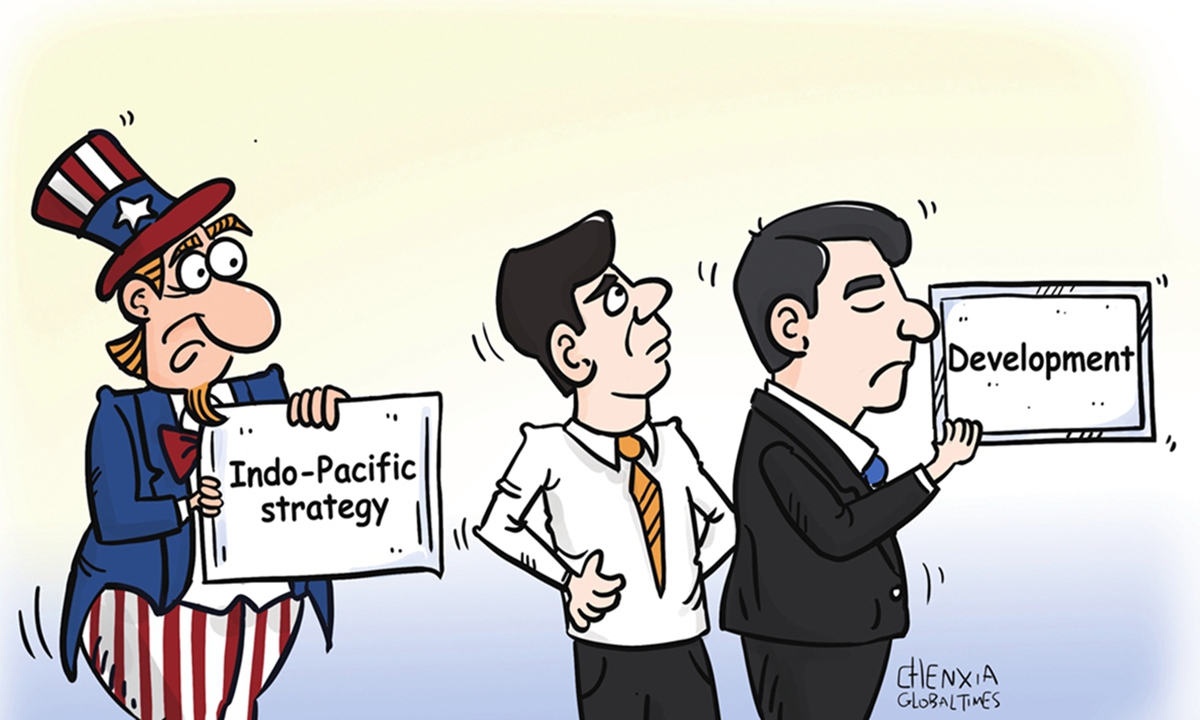
Illustration: Chen Xia/GT
Despite grappling with conflicts between Russia and Ukraine and between Israel and Palestine, the US is still trying to focus on the Indo-Pacific region. US Defense Secretary Lloyd J. Austin will embark on his ninth visit to the Indo-Pacific region this week, with visits to India, South Korea and Indonesia. The US Department of Defense stated that this visit demonstrates the increasingly close cooperation between the US and its allies.US Secretary of State Antony Blinken, who just concluded the G7 Foreign Ministers' Meeting in Japan, will also travel to South Korea and India to advance efforts to "support a free and open Indo-Pacific region."
The Chairman of the Joint Chiefs of Staff will also visit the Indo-Pacific region soon. Although not explicitly stated, these agendas are almost all aimed at containing China. Sun Xihui, an associate research fellow with the National Institute of International Strategy at the Chinese Academy of Social Sciences, told the Global Times that against the backdrop of the conflicts between Russia and Ukraine and between Israel and Palestine, the Biden administration still sends high-ranking officials to the Indo-Pacific region, and these high-profile visits show that the Biden administration does not want the progress of the Indo-Pacific Strategy to be affected by the two conflicts. This clearly demonstrates that the Biden administration, or the US political decision-making circle, still considers countering China as a top priority.
Li Wei, an expert on national security at the China Institute of Contemporary International Relations, told the Global Times that regardless of any geopolitical conflict in the world, the US regards China as its main strategic competitor and this will not change. The US' strategic focus on the Indo-Pacific region will continue.
The Pentagon boasted that Austin's trip will demonstrate how "diverse" the US "security architecture" in the Indo-Pacific region is. Sun analyzed that the diversity of the regional security architecture mentioned by the US mainly refers to the US Asia-Pacific alliance system as the core and then extends outward, including bilateral and small multilateral mechanisms. These extended regions involve Northeast Asia, Southeast Asia, and the South China Sea, among others. This diversity includes not only the diversity of the main body but also the diversity of mechanisms and coverage areas. However, Sun pointed out that the goal of the US to extend or deepen bilateral alliances into trilateral or quadrilateral alliance mechanisms faces great challenges.
An article in Foreign Policy magazine on Tuesday said, "The United States needs stronger alliances precisely because it can no longer manage the many global problems it faces alone. This is especially true for the rise of China." Sun told the Global Times that China's rise is unique in that it rises largely on its own, despite China's openness to the outside world, including the West. Therefore, China's rise will not be hindered or jeopardized by external pressure. From this perspective, no matter how the US boasts its alliance system, it cannot suppress China's rise.
The US should be aware that its allies and partners will not solely align with the US and they will make decisions based on their own interests. The recent improvement in China-Australia relations serves as an example. While US pundits worry that China will seek opportunities to sow discord into US alliance system and test alliance commitments, they had better look into whether the US still has confidence in its allies and its own influence and strength. The worries from within the US show that the US is not that confident in its relations with its allies. As the Russia-Ukraine war and the Israel-Palestine conflict drag on, the US is providing weapons to escalate the war while advancing the Indo-Pacific Strategy. This has not only increased tensions in China's surrounding areas but also brought negative impact to regional countries. Neither China nor other countries in the Indo-Pacific region want to see this happen. Unity is a cliché used by the US to seduce allies and partners. But behind this is Washington's strong push to achieve self-interests and forcefully bind regional countries to promote camp confrontation. The goal of its strategy to contain China is not only self-serving, but also arrogant.
Currently, due to the constraints of the Russia-Ukraine war and the Israeli-Palestinian conflict, the US has fallen into strategic overstretch. In this situation, the US is still eager to increase its input in the Asia-Pacific region in an attempt to contain China. However, it is important to note that containing China is already a mission impossible. If the current approach persists, the US will only find itself stretched too thin.
The author is a reporter with the Global Times. opinion@globaltimes.com.cn

